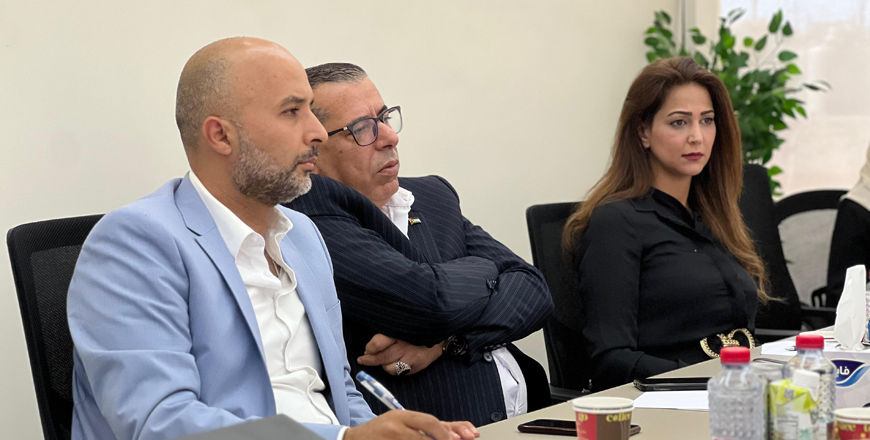You are here
Performance Index Centre KAFA’A holds discussion "100 Days till elections"
By JT - Jun 03,2024 - Last updated at Jun 04,2024

Performance Index Centre “KAFA’A” holds a discussion session titled "100 Days till elections" at its headquarters (Photo courtesy of KAFA’A)

AMMAN — On Saturday, Performance Index Centre “KAFA’A” held a discussion session titled "100 Days till elections" at its headquarters, hosting Jihad Momani, a member of the Independent Election Commission Board of Commissioners, Ali Khawaldeh, Secretary-General of the Ministry of Political and Parliamentary Affairs, and a group of gentlemen, ladies, and youth, according to a statement for The Jordan Times.
The session revolved around a set of questions, most notably the main challenges facing the Independent Election Commission. Momani explained that challenges exist in every electoral experience, such as the permanent challenges of seat distribution among population blocs or high-density cities, which have been considered in the current distribution.
There are also procedural challenges in the field, such as schools that often need additions and improvements to prepare them, data and information protection operations, and trust in elections. This represents an important challenge as the IEC faces what is issued from political salons, described as election engineering, where these groups can influence and invest in the emotional aspects.
Regarding the role of the Ministry of Political and Parliamentary Affairs, Khawaldeh confirmed that the ministry and the government are supporters and partners in the success of the electoral process, but they have no direct intervention in managing the elections, as the IEC is the responsible body for that.
The role of the ministry has now changed after the approval of the legislation and political modernisation system, the statement said.
Regarding the level of democracy in Jordan, Khawaldeh indicated that it exists at the highest levels, as democracy is not limited to elections only but is a way of life. Our legislation is very good, but the challenge lies in the democratic culture. When we are classified, a group of organisations concerned with producing the results in this way is relied upon.
Momani agreed on this point, noting that the reports issued are not true but are directed at developing countries, classifying them in an accusation category. He emphasised that elections are one of the means of achieving democracy. We strive to reach a reality where we elect our representatives, but the state now suffers from a trust issue.
The trust between the citizen and the party is shaky, and there is a misunderstanding between the parties. The IEC today is trying to plant the seed of trust and is working with the parties on that. Momani also explained that the state suffers from the issue of bringing parties and citizens closer.
As for the IEC’s monitoring of the programmes presented through official media and how they are managed, Mbaidheen, the performance index centre’s CEO, indicated that the centre has put itself and its trust on the line, with the presence of the Compliance Index, which monitors and evaluates the commission's performance and its compliance with international and regional systems and standards, including ensuring fairness and access for all parties to appear on official media, according to the statement.
Regarding the role of official media, Khawaldeh explained that official media needs support from all institutions, and citizens' trust in it must be enhanced. Our media must develop and modernise.
Concerning the accessibility of people with disabilities, Momani confirmed that the IEC has prepared 95 model polling centres distributed across 18 districts, where the journey of a voter with special needs begins with facilities from the moment the person enters until they finish the voting process, the statement said.
Related Articles
AMMAN — The Independent Election Commission (IEC) on Monday said it had found 165 violations committed by individuals who plan to run for th
AMMAN — About 47.7 per cent of Jordanians believe that “interests” are is the top priority to join political parties, according to a public
AMMAN — The Independent Election Commission (IEC) on Monday said it has the authority to change the designated date of parliamentary electio
















